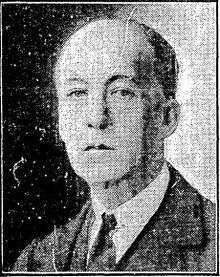Arthur Ponsonby, 1st Baron Ponsonby of Shulbrede
| The Right Honourable The Lord Ponsonby of Shulbrede | |
|---|---|
 | |
| Chancellor of the Duchy of Lancaster | |
|
In office 13 March – 25 August 1931 | |
| Prime Minister | Ramsay MacDonald |
| Preceded by | Clement Attlee |
| Succeeded by | The Marquess of Lothian |
Arthur Augustus William Harry Ponsonby, 1st Baron Ponsonby of Shulbrede (16 February 1871 – 23 March 1946) was a British politician, writer, and social activist. He was the third son of Sir Henry Ponsonby, Private Secretary to Queen Victoria, and the great-grandson of Frederick Ponsonby, 3rd Earl of Bessborough. Frederick Edward Grey Ponsonby, 1st Baron Sysonby, was his elder brother.
Ponsonby is often quoted as the author of the dictum "When war is declared, truth is the first casualty", published in his book Falsehood in War-time, Containing an Assortment of Lies Circulated Throughout the Nations During the Great War (1928). However, he uses this phrase in quotation marks as an epigram at the start of the book and does not present it as his own words. Its likely origin is the almost identical line spoken in 1917 by the United States Senator Hiram Johnson: "The first casualty when war comes is truth".[1]
Education and early career
Ponsonby was a Page of Honour to Queen Victoria from 1882 to 1887. He was educated at Eton College and Balliol College, Oxford, before joining the Diplomatic Service and taking assignments in Constantinople and Copenhagen.
Politics
At the 1906 general election, Ponsonby stood unsuccessfully as Liberal candidate for Taunton. He was elected as Member of Parliament for Stirling Burghs at a by-election of 1908.
In Parliament, Ponsonby opposed the British involvement in the First World War, and with George Cadbury, Ramsay MacDonald, E. D. Morel, Arnold Rowntree, and Charles Trevelyan, he was a member of the Union of Democratic Control, which became a prominent anti-war organization in Britain.
Ponsonby was defeated at the 1918 general election, when he stood as an "Independent Democrat" in the new Dunfermline Burghs constituency.[2] He then joined the Labour Party and returned to the House of Commons at the 1922 general election as member for the Brightside division of Sheffield.[2]
In 1924, Ramsay MacDonald appointed Ponsonby as Parliamentary Under-Secretary of State for Foreign Affairs, and he later served as Under-Secretary of State for Dominion Affairs and then as Parliamentary Secretary to the Ministry of Transport in 1929.

In 1930, Ponsonby was raised to the peerage as a hereditary Baron, taking the title Lord Ponsonby of Shulbrede from his home at Shulbrede Priory in Sussex. He served as leader of the Labour Party in the House of Lords from 1931 until 1935, resigning because he was opposed to the party's policy on sanctions against Italy for its invasion of Abyssinia.
In 1927–1928, Ponsonby ran a significant Peace Letter campaign against British preparations for a new war, and from 1936 he was an active member of the Peace Pledge Union, contributing regularly to Peace News.
Ponsonby opposed the initiative of Lord Charnwood and Cosmo Gordon Lang, Archbishop of Canterbury, to ask his Majesty's Government to react against the genocidal Holodomor policies of the Soviet Government.[3][4]
Resignation
In May 1940 Ponsonby resigned from the Labour Party, opposing its decision to join the new coalition government of Winston Churchill.
He wrote a biography of his father which won the James Tait Black Memorial Prize in 1942: Henry Ponsonby, Queen Victoria's Private Secretary: His Life and Letters.
Death
Ponsonby died on 23 March 1946 and was succeeded by his son Matthew Henry Hubert Ponsonby.
Personal life and family
On 12 April 1893 he married Dorothea Parry, daughter of Hubert Parry and Elizabeth Maude Herbert (1851–1933), herself a daughter of Sidney Herbert, 1st Baron Herbert of Lea. They had a daughter, Elizabeth (1900–1940), who during the 1920s became well known as a leading figure of the Bright Young People,[5] and a son, Matthew (1904–1976), who became the 2nd Baron.
Works
- The Priory and Manor of Lynchmere and Shulbrede (1920).
- The Camel and the Needle's Eye (1910).
- The Decline of the Aristocracy (1912).
- Falsehood in Wartime (1928).
- Henry Ponsonby: his Life from his Letters (1942).
See also
Notes
- ↑ Hiram Johnson in U. S. Senate, 1918, quoted in The Quote Verifier: Who Said What, Where, and When, by Ralph Keyes, Macmillan, p. 228, 2006, ISBN 0-312-34004-4
- 1 2 Craig, F. W. S. (1983) [1969]. British parliamentary election results 1918–1949 (3rd ed.). Chichester: Parliamentary Research Services. ISBN 0-900178-06-X.
- ↑ In the Parliament, in The Times dated July 26, 1934
- ↑ "Russia, vol 93 cc1097-117". Hansard 1803–2005 Lords Sitting. 25 July 1934. Retrieved 9 January 2013.
- ↑ D. J. Taylor, Bright Young People: The Lost Generation of London's Jazz Age (2007).
References
- Charles Kidd, David Williamson, (editors) Debrett's Peerage and Baronetage, 1990 edition (New York: St Martin's Press, 1990)
- Leigh Rayment's Peerage Pages
- Leigh Rayment's Historical List of MPs
External links
| Wikiquote has quotations related to: Arthur Ponsonby, 1st Baron Ponsonby of Shulbrede |
- Works by or about Arthur Ponsonby, 1st Baron Ponsonby of Shulbrede at Internet Archive
- Catalogue of the papers of Arthur Ponsonby at the Bodleian Library, Oxford
- Falsehood in War-Time: Propaganda Lies of the First World War by Arthur Ponsonby MP
- Two pictures of Ponsonby at The National Portrait Gallery (UK)
- Brief bio at Spartacus Schoolnet
- The Ponsonby Rule at the Wayback Machine (archived August 1, 2003) Google HTML of a PDF document.
- Arthur Ponsonby's Dream
- Hansard 1803–2005: contributions in Parliament by Arthur Ponsonby